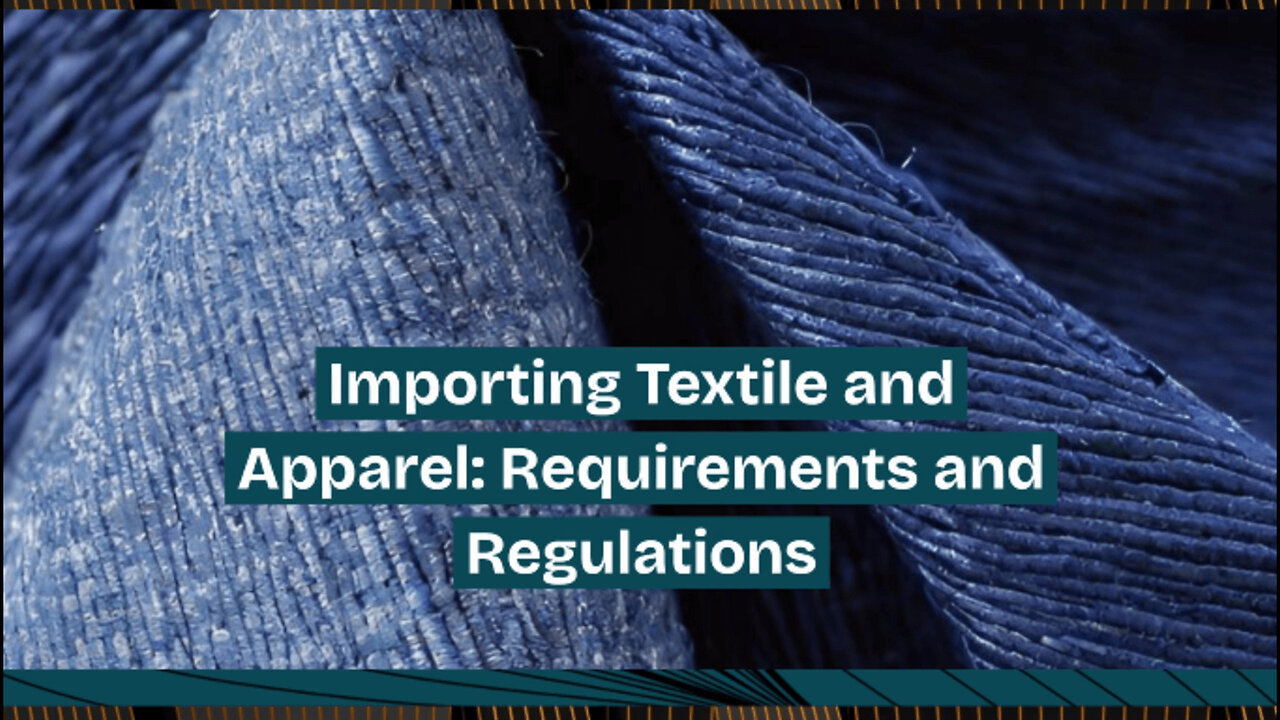Premium Only Content

Demystifying Textile and Apparel Importing: What You Need to Know
ISF Solution | (832-904-9333)
clearance@isfsolution.com | www.isfsolution.com
Importing goods subject to textile and apparel product regulations can be a complex process that requires compliance with specific requirements. Working with a licensed customs broker is an important first step, as they act as intermediaries between importers and government authorities, ensuring that all necessary documentation is properly prepared and submitted.
One of the key documents required when importing textile and apparel products is the Importer Security Filing (ISF), also known as the 10+2 rule. This filing must be submitted at least 24 hours prior to loading the goods onto a vessel bound for the United States. It provides important information to the US Customs and Border Protection (CBP) regarding the imported goods, such as the shipper, consignee, and product descriptions.
Another essential requirement is the customs bond, which serves as a financial guarantee to ensure payment of potential duties, taxes, fines, or penalties that may arise during the import process. Importers must obtain a customs bond from a surety company authorized by the US Department of the Treasury. This is a security measure to protect the interests of CBP and the revenue of the country.
Compliance with textile and apparel product regulations set by the US government is also crucial. This includes meeting labeling requirements, such as proper country of origin marking, fiber content, and care instructions. The products must also meet safety standards and be free from prohibited substances. Close collaboration with suppliers and manufacturers is essential to ensure compliance with these requirements.
Once all the necessary documents have been prepared and submitted, the imported goods undergo the customs clearance process, involving an inspection by customs officers. This process verifies the accuracy of the provided information and ensures compliance with regulations. If any discrepancies or issues are found, additional documentation or actions may be required.
To successfully import goods subject to textile and apparel product regulations, it is important to work with a licensed customs broker and have a good understanding of the requirements. This will help ensure compliance and minimize delays or penalties. Importers should prioritize attention to detail and strive to meet all necessary regulations and standards.
In conclusion, importing goods subject to textile and apparel product regulations requires working with a licensed customs broker, understanding the necessary documents, and complying with labeling, safety, and quality standards. It is important to engage professionals in customs brokerage and remain vigilant throughout the importation process to ensure a successful outcome.
#ImportingGoods #TextileRegulations #ApparelProductRegulations #CustomsBroker #CustomsBond #ComplianceRequirements #LabelingStandards #CustomsClearance #InternationalTrade #ImportingTips
Video Disclaimer Here: For educational purposes - No affiliation with US government sectors.
00:33 - Importing goods subject to textile and apparel product regulations requires working with a licensed customs broker to ensure compliance with customs and trade regulations.
00:53 - Specific documents such as the Importer Security Filing (ISF) and customs bond are essential for importing textile and apparel products.
01:52 - Compliance with labeling, safety, and quality standards set by the US government is crucial for successful importation.
02:46 - Working closely with suppliers and manufacturers, as well as understanding customs clearance processes, can help streamline the importation process and minimize delays or penalties.
"
-
 LIVE
LIVE
Scottish Viking Gaming
5 hours ago🔴LIVE | STALKER 2 | Sunday Funday | The Zone makes my Brain Fuzzy
140 watching -
 3:57:16
3:57:16
LumpyPotatoX2
6 hours agoNew Fortnite Season - #RumbleGaming
27.4K3 -
 15:06
15:06
Forrest Galante
21 hours agoShooting Invasive Flying Carp with a Bow
144K48 -
 6:39:16
6:39:16
Akademiks
1 day agoThis is How Drake Comes Back!! Kendrick First Week Sales in. Diddy, Durk, YSL Update.
311K49 -
 10:29
10:29
TimcastIRL
2 days agoJoe Rogan SLAMS Joe Biden For ESCALATING The War In Ukraine
164K235 -
 14:21
14:21
Scammer Payback
25 days agoHacked Scammer Laptop to find their location
88K63 -
 1:07:55
1:07:55
Bright Insight
23 hours agoThis Happened on the JRE Podcast...
249K136 -
 34:52
34:52
MYLUNCHBREAK CHANNEL PAGE
1 day agoThe Lost City
246K116 -
 9:04
9:04
Tundra Tactical
22 hours ago $32.43 earnedTrump's AG Pick Pam Bondi is TROUBLE!
133K61 -
 1:02:02
1:02:02
PMG
1 day ago $22.52 earned"Man Films FBI Coming to His Home Over Alleged Social Media Posts - Jeremy Kauffman"
97.8K17